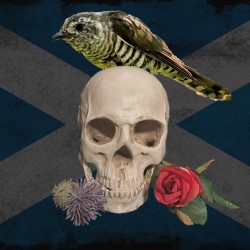EDINBURGH, SCOTLAND — It would have felt inappropriate to attend a theatre festival in Scotland and not witness at least one show that related to what is known as “The Scottish Play.” Dunsinane, written by David Greig, is a sequel to MacBeth. Different than all the other shows I am seeing, this is not a new play at all, having first premiered at the Royal Shakespeare Company in 2010. Dunsinane has the audience discover that Lady MacBeth is not dead, but hidden in the castle and known in this production as Gruach, played by Wendy Brindle, who the real life character in the play was based off of.
Produced by Necessary Cat Theatre in Edinburgh, and directed by Angela Harkness Robertson. I learned that this troupe does a production of MacBeth first and then performs Dunsinane immediately after. Founded in 2023, Necessary Cat Theatre started as a company with a mission to produce quality theatre and give opportunity for anyone to participate in performing arts. Certainly something that UTBA believes in.
In this production there were quite a few standouts. The first is the sound design by Dug Campbell. I have always found MacBeth to be a haunting story, and this imagined continuation, the fate of Scotland in the aftermath, remains just as haunting. The sounds that Campbell has included, from music to technical elements, have added to that ambiance in magical ways. This is coupled with the Gaelic songs included in the production. Abby Hanson served as the Gaelic consultant and vocal music director, and her work was flawless. Hanson also played Lulach, the Queen’s son, who only speaks Gaelic, which was a treat to behold. Reading Hanson’s bio and learning that she is a med school student on top of all of her talents on the stage was astounding.
Brindle in the role of Gruach was impressive in her character development of someone whose story is bloody and full of discontent, I found myself feeling empathy. I felt the same way with the character of Siward played by Campbell who had also done the sound design. The unlikely connection of these two characters in the plot is difficult to pull off. The chemistry that these two actors displayed shows a great deal of skill and effort. The contrast of this relationship and the outright narcissism of Malcolm, played by James Scott, was also a telling piece of theatre. Scott was entertaining to watch because of his ability to show how quickly power can corrupt, and how a person can lose sight of caring at all about leadership, but instead just caring about power and the perks that come with it.
The direction of Robertson and her thoughtfulness that she put into her director’s note regarding the timeliness of Greig’s 2010 script for our current world political climate, and how we send our young people off to war that they do not understand. There were also a lot of plot lines and commentary about people seeking political power. Being an American at a UK festival, this was interesting knowing that I am coming from an intense political canvas. I try to make it a point to know more than just what is happening in my own backyard, so I am aware that some of the scenes that played out on stage are also indicative of what is happening globally, and Robertson’s direction made that understanding clear.
One other note within the program was that within the cast are people who have had a great deal of experience on the stage and newcomers working side by side to create quality theatre, and while there were some small elements where this was evident, largely this felt like a fully polished, professional production. While most of what I have seen at the Fringe have been smaller shows both in size and length, this was a full-length production with an “interval”, beautiful costumes also by Robertson, and a full cast and ensemble dedicated to telling the untold story of what might have happened after the death of MacBeth.
[box] Dunsinane plays at various times through August as part of the Edinburgh Fringe Festival. The cost is 15 pounds. For more information see www.edfringe.com [/box]
